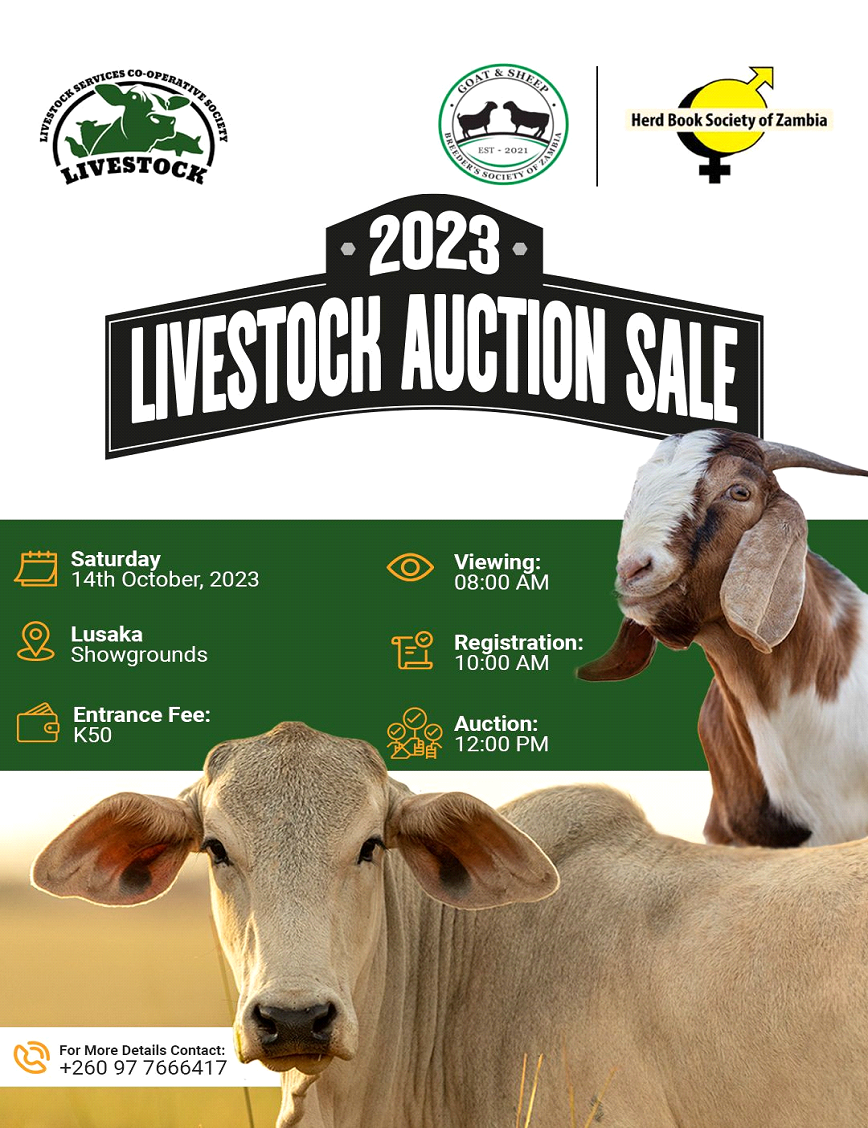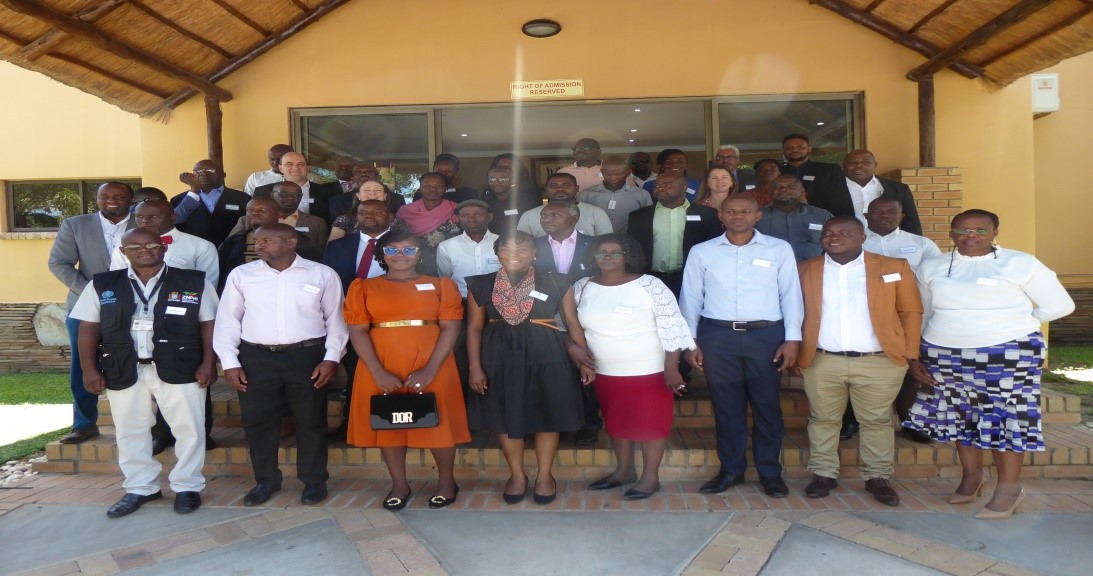27 IN-SERVICE INAUGURAL COHORT GRADUATES FROM THE ZAMBIA INSTITUTE OF ANIMAL HEALTH COLLEGE

- Dominic Nali
- 21 Apr, 2024
Veterinary
field epidemiologists in the livestock sector are the first line of defense against animal diseases that can
also affect humans. The Food and Agriculture Organization of the United Nations
(FAO), in collaboration with the United States Agency for International
Development (USAID) is supporting efforts towards the Frontline In-service
Applied Veterinary Epidemiology Training (ISAVET) program in Zambia.
The training programme has had its first cohort of 27 in-service trainees from the Ministry of Fisheries and Livestock drawn from Lusaka, Southern and Western provinces. The ISAVET programme is aimed at developing transferable, critical thinking skills amongst Veterinarians to strengthen preparedness and early response to animal disease outbreaks.
Fisheries and Livestock Permanent Secretary Engineer Himba Cheelo who officiated at the graduation ceremony in Lusaka recently, said Frontline Applied Veterinary Epidemiology is a pivotal pillar in animal and public health. Engineer Cheelo said the FAO has so far successfully launched the Frontline In-Service Applied Veterinary Epidemiology Training (ISAVET) program in 22 countries with Zambia being the 23rd country in Africa.
“The Frontline In-Service Applied Veterinary Epidemiology Training ISAVET will help in bolstering and enabling officers in the frontline are able to detect and provide effective early responses to animal diseases,” Engineer Cheelo said. She said it is worth noting that major pandemic throughout history both past and present have originated in animals. Ms Cheelo said disease such as COVID-19, AVIAN Influenza, Black Death, SARS, Ebola, swine Flu and even major zoonotic diseases have been traced back to the animal kingdom.
“Most recently the Anthrax outbreak in Southern province serves as a poignant reminder of the critical role our cadre of Veterinarians and veterinary para-professionals play in safeguarding public health,” she said. She said that beyond ISAVET’S pivotal role in animal health, the strong soco-economic connection they possess within rural communities position them ideally for prompt detection, reporting and response to future zoonotic pandemics.
Deficiencies to prevent, detect and respond
to outbreaks timely in the animal health sector have often contributed to
continuous animal health threats across the country. Therefore, having enough
and well-trained veterinary epidemiology officers means protected human health,
reduced animal losses, assured consumer protection and promotion of safe trade
in the country. She said this in a speech read on her behalf by the Human
Resources and Administration Director Ignatius Daka.
The Food and Agriculture organisation of the United Nations Country Representative Suze Percy Filippini said the ISAVET program is a milestone in the journey to enhance the capacity of veterinary services in disease surveillance and uphold the principles of One Health. Ms Filippini said the initiative that has generously been funded by the United States Government through the United States Agency for International Development (USAID) is in line with the Food and Agriculture Organisation’s action plan that seeks to support the one health agenda and improve the management of emerging animal and human related health risks.
“By actively assisting selected countries in sub-Sahara Africa including Zambia, we aim to strengthen disease surveillance and risk management at the human animal ecosystem interface,” Ms Filippini said. She noted that through locally joint strategies and innovative tools, FAO endeavours to combat diseases and microbial resistance that pose significant threats to public health, poverty alleviation and human livelihoods.
“The skills acquired by ISAVET trainees will significantly bolster Zambia’s Veterinary Services by mitigating the burden of zoonotic diseases and Transboundary Animal Diseases,” Ms Filippini said. She said these efforts will also contribute to enhancing livelihoods, fostering economic growth, ensuring food security, and advancing the Agenda 2030 for Sustainable Development for better production, better nutrition, a better environment and a better life, leaving no one behind.
While, United States Agency for
International Development (USAID) Mission Deputy Director Robin SHARMA said the
skills and knowledge gained through the ISAVET program will serve as a solid
foundation for future works because the skills will strengthen
Zambia’s public health systems to protect the health and safety of all animals and people in Zambia. Mr Sharma said 75% of new and emerging infectious diseases are zoonotic or spread from animal to people. “This makes your training more essential than ever and the skills you have acquired critical because you are literary the first line of defence against zoonotic infectious disease threats,” Mr Sharma.
He said the Anthrax break-out in 2023 may not be the last zoonotic disease threat the country may have encountered considering the prolonged droughts the country is facing that might force both humans and animals to search further beyond for water and food sources. And speaking earlier, Frontline In-Service Applied Veterinary Epidemiology (ISAVET) National Program Coordinator Humphrey Banda said the training is, hands-on and aimed at building a cadre of skilled frontline veterinarians who can conduct effective surveillance and outbreak response under a One Health approach.
Dr Banda said the ISAVET program was generated because of deficiencies being experienced in field epidemiology and animal health surveillance systems. “The ISAVET program was brought about through the SET evaluation conducted by the Food and Agriculture Organization of the United Nation and the Performance of Veterinary Services evaluation conducted by the Office of International Epizooties (OIE),” Dr Banda said.
He said the ISAVET program is focused on enhancing epidemiological skills in the frontline staff in the Ministry of Fisheries and Livestock so that they can address emerging infectious diseases and transboundary animal diseases in the country. Field epidemiology is an important area that supports timely and rapid response to transboundary, zoonotic, and other health conditions of public health importance that limit productivity.
Therefore, In-Service Applied Veterinary Epidemiology Training (ISAVET) programme is one such capacity building initiative that has strengthened the animal health services capacity since the pilot phase in 2018 within the African region. Blessings Kantu Kalimbika, an In-Service Applied Veterinary Epidemiology Trainee from Senanga district in Western province said the training was a reminder to all the ISAVETEES (graduates) that they entered to learn and depart to serve the country.
“Today as we leave this place, we are more than equal to the task because when it comes to the knowledge in the prevention of animal health threats, we have it, rapid response to animal health security threats, we have it, improved and early detection of animal health security threats, we have it,” Ms Kalimbika said. Ms Kalimbika said the six months they have been in training, ISAVETEEs have been able to gain skills and undertake research that seeks to address the needs of the local farmers in areas like Kavalamanja, Mkandanzovu and Sinjembela.
Timely
dissemination of animal disease information to relevant stakeholders
facilitates prompt action when necessary, making it vital in managing both
emerging and reemerging diseases. It is therefore upon the ISAVETEEs to put
into practice what they have gained in the last six months and save lives in
the country. -NAIS
Leave a Reply
Your email address will not be published. Required fields are marked *
idkxtetmj
AGRI BUSINESS NEWS | YOU FARM WE INFORM <a href="http://www.gop0209t6663p4f57tuh4316lgbo0hsss.org/">aidkxtetmj</a> idkxtetmj http://www.gop0209t6663p4f57tuh4316lgbo0hsss.org/ [url=http://www.gop0209t6663p4f57tuh4316lgbo0hsss.org/]uidkxtetmj[/url]
.jpg)












